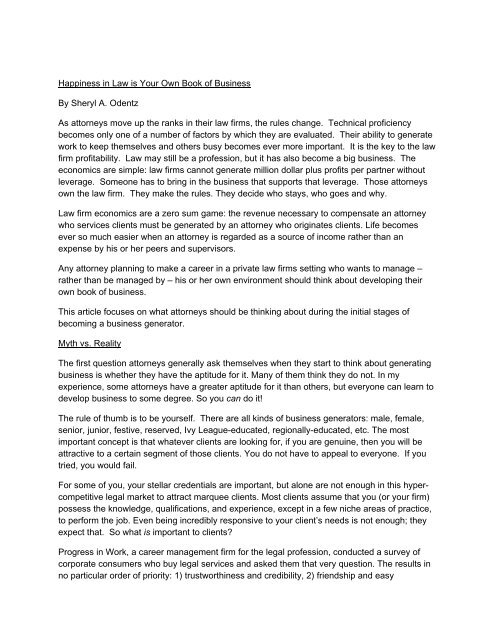Happiness in Law is Your Own Book of Business By Sheryl A ...
Happiness in Law is Your Own Book of Business By Sheryl A ...
Happiness in Law is Your Own Book of Business By Sheryl A ...
- No tags were found...
You also want an ePaper? Increase the reach of your titles
YUMPU automatically turns print PDFs into web optimized ePapers that Google loves.
<strong>Happ<strong>in</strong>ess</strong> <strong>in</strong> <strong>Law</strong> <strong>is</strong> <strong>Your</strong> <strong>Own</strong> <strong>Book</strong> <strong>of</strong> Bus<strong>in</strong>ess<strong>By</strong> <strong>Sheryl</strong> A. OdentzAs attorneys move up the ranks <strong>in</strong> their law firms, the rules change. Technical pr<strong>of</strong>iciencybecomes only one <strong>of</strong> a number <strong>of</strong> factors by which they are evaluated. Their ability to generatework to keep themselves and others busy becomes ever more important. It <strong>is</strong> the key to the lawfirm pr<strong>of</strong>itability. <strong>Law</strong> may still be a pr<strong>of</strong>ession, but it has also become a big bus<strong>in</strong>ess. Theeconomics are simple: law firms cannot generate million dollar plus pr<strong>of</strong>its per partner withoutleverage. Someone has to br<strong>in</strong>g <strong>in</strong> the bus<strong>in</strong>ess that supports that leverage. Those attorneysown the law firm. They make the rules. They decide who stays, who goes and why.<strong>Law</strong> firm economics are a zero sum game: the revenue necessary to compensate an attorneywho services clients must be generated by an attorney who orig<strong>in</strong>ates clients. Life becomesever so much easier when an attorney <strong>is</strong> regarded as a source <strong>of</strong> <strong>in</strong>come rather than anexpense by h<strong>is</strong> or her peers and superv<strong>is</strong>ors.Any attorney plann<strong>in</strong>g to make a career <strong>in</strong> a private law firms sett<strong>in</strong>g who wants to manage –rather than be managed by – h<strong>is</strong> or her own environment should th<strong>in</strong>k about develop<strong>in</strong>g theirown book <strong>of</strong> bus<strong>in</strong>ess.Th<strong>is</strong> article focuses on what attorneys should be th<strong>in</strong>k<strong>in</strong>g about dur<strong>in</strong>g the <strong>in</strong>itial stages <strong>of</strong>becom<strong>in</strong>g a bus<strong>in</strong>ess generator.Myth vs. RealityThe first question attorneys generally ask themselves when they start to th<strong>in</strong>k about generat<strong>in</strong>gbus<strong>in</strong>ess <strong>is</strong> whether they have the aptitude for it. Many <strong>of</strong> them th<strong>in</strong>k they do not. In myexperience, some attorneys have a greater aptitude for it than others, but everyone can learn todevelop bus<strong>in</strong>ess to some degree. So you can do it!The rule <strong>of</strong> thumb <strong>is</strong> to be yourself. There are all k<strong>in</strong>ds <strong>of</strong> bus<strong>in</strong>ess generators: male, female,senior, junior, festive, reserved, Ivy League-educated, regionally-educated, etc. The mostimportant concept <strong>is</strong> that whatever clients are look<strong>in</strong>g for, if you are genu<strong>in</strong>e, then you will beattractive to a certa<strong>in</strong> segment <strong>of</strong> those clients. You do not have to appeal to everyone. If youtried, you would fail.For some <strong>of</strong> you, your stellar credentials are important, but alone are not enough <strong>in</strong> th<strong>is</strong> hypercompetitivelegal market to attract marquee clients. Most clients assume that you (or your firm)possess the knowledge, qualifications, and experience, except <strong>in</strong> a few niche areas <strong>of</strong> practice,to perform the job. Even be<strong>in</strong>g <strong>in</strong>credibly responsive to your client’s needs <strong>is</strong> not enough; theyexpect that. So what <strong>is</strong> important to clients?Progress <strong>in</strong> Work, a career management firm for the legal pr<strong>of</strong>ession, conducted a survey <strong>of</strong>corporate consumers who buy legal services and asked them that very question. The results <strong>in</strong>no particular order <strong>of</strong> priority: 1) trustworth<strong>in</strong>ess and credibility, 2) friendship and easy
a client or potential client <strong>in</strong> the span <strong>of</strong> an elevator ride from the lobby <strong>of</strong> a build<strong>in</strong>g to let’s saythe 30 th floor.Who Do You Know?Accord<strong>in</strong>g to consultant Harry Mills, the author <strong>of</strong> The Ra<strong>in</strong>maker Toolkit, the chances <strong>of</strong> sell<strong>in</strong>gto (i) an ex<strong>is</strong>t<strong>in</strong>g client are better than one <strong>in</strong> two; (ii) the chances <strong>of</strong> sell<strong>in</strong>g to a former client areone <strong>in</strong> three; and (iii) the chances <strong>of</strong> successfully sell<strong>in</strong>g to a fresh prospect are one <strong>in</strong> eight. Ifyou are very junior, you probably do not have ex<strong>is</strong>t<strong>in</strong>g clients that you have orig<strong>in</strong>ated. If you aremore senior, there <strong>is</strong> a better chance that you do. Start to take stock <strong>of</strong> people you know whoare consumers <strong>of</strong> legal services or who know consumers <strong>of</strong> legal services <strong>of</strong> the type youprovide. Create a network<strong>in</strong>g l<strong>is</strong>t, which you can divide <strong>in</strong>to three categories:Prospect – A prospect <strong>is</strong> any person who can or will buy your legal services now or <strong>in</strong>the relatively near future because they have a problem that needs to be solved.Prospects provide most <strong>of</strong> the opportunities and should be v<strong>is</strong>ited and contacted most<strong>of</strong>ten.Connector – A connector <strong>is</strong> any person who can or will buy legal services now or atsome po<strong>in</strong>t <strong>in</strong> the near future. They are any person who knows other people <strong>in</strong> yourtarget market and whom you are prospect<strong>in</strong>g. Connectors are v<strong>is</strong>ited less <strong>of</strong>ten thanprospects and provide average size opportunities.Alliance Partner – An alliance partner <strong>is</strong> any person who sells complementary servicesor <strong>of</strong>fer<strong>in</strong>gs and who shares your target focus. Smaller opportunities ex<strong>is</strong>t with alliancepartners.In conclusion, develop<strong>in</strong>g a book <strong>of</strong> bus<strong>in</strong>ess can take a long time to master. But the good news<strong>is</strong> no matter how junior or senior you are, it <strong>is</strong> never too late to learn.<strong>Sheryl</strong> Odentz <strong>is</strong> the founder and president <strong>of</strong> Progress <strong>in</strong> Work LLC, a career management firm forattorneys focus<strong>in</strong>g on bus<strong>in</strong>ess development tra<strong>in</strong><strong>in</strong>g/coach<strong>in</strong>g, executive coach<strong>in</strong>g, career counsel<strong>in</strong>gand outplacement. sodentz@progress<strong>in</strong>work.com or www.progress<strong>in</strong>work.com.
















